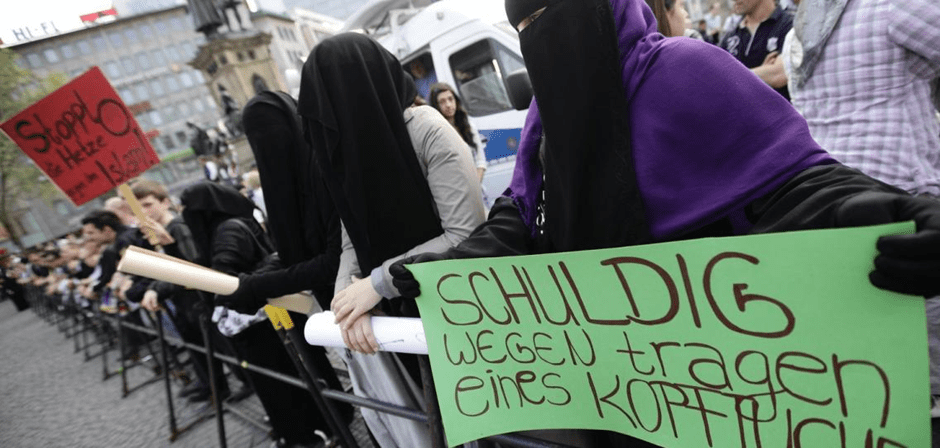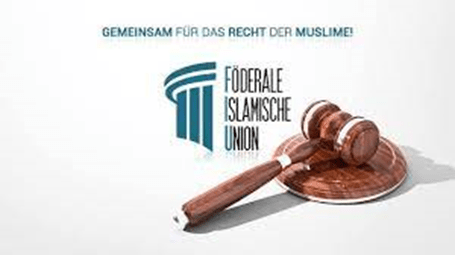
By Arndt Emmerich
[Cover image note: Pierre Vogel delivering a seminar on voting during the 2023 elections in Turkey. ©Arndt Emmerich]
“Am I a kafir [nonbeliever], if I vote for [Turkey’s president] Erdogan?” a question asked by the prominent Salafi leader, Pierre Vogel, to his audience gathered for a seminar in a local mosque in Germany. It was a timely question, given that some members of the congregation belonged to the more than 1.4 million Germans with voting rights in Turkey and Turks residing in Germany who were eligible to vote in the 2023 general election in Turkey. During the discussion, one attendee remarked that “Muslims should not participate in a democratic system.” Somewhat annoyed, Vogel replied ”But you live in a democracy. You don’t get choice” before he explained that an election is “the social mechanism of who will govern over you. If you don’t vote, does that mean the sharia will rule you? Of course not!” By invoking notions of common sense, compromise, and individual responsibility, the veteran preacher said that “You are not a kafir, if you vote for the person, who tries to avoid mukaab [evil]… According to sharia, if you have two contenders, with party A promising to ban the niqab and party B not promising anything of that kind, you vote for B, as more Sharia such as Islamic dress code and dietary rules can be practised.” This vignette indicates that some Salafi actors in Germany are proactively addressing questions of political participation and engaging with secularism and democracy.
In my recently published article in Politics and Religion, I report on a mosque-based ethnography between 2018 and 2021 and textual analysis of sermons and seminar content. My research shows that Salafism, a particularly conservative form of Sunni Islam with its literal interpretations and isolationist tendencies characterised by sharp boundary framing against other Muslims and non-Muslims, has changed over time. In Germany, it initially relied on informal grassroots mobilization to engage in politics. By now, the movement is confronted with the question of whether to pursue formal organization and institutionalization and whether to establish stable legal representations and political associations to advance its cause, similar to other Muslim groups and Islamic traditions in Western Europe.
The success of the Salafi movement since the 1970s has been associated with the funding of mosques and religious education from Saudi Arabia. In Europe, Salafism has developed local roots with contextual understandings and practises addressing challenges faced by young Muslim minorities through the use of charismatic and person-centric communication, flat hierarchies, and informal networks. With currently more than 11.000 political Salafis, including a small number of Islamic State (IS) supporters and a substantially larger yet unknown number of ordinary Salafis, who are not officially counted by state authorities, Salafism has been seen as the most dynamic and fastest growing Islamic movement in Germany from 2010 onwards. Non-violent and quietest Salafis constitute the vast majority in Germany, adhering to the Islamic authorities in Saudi Arabia, but also apply such guidance to the German context as a religious minority.
Since the early 2000s, the movement gained momentum with predominately young adults asserting their Islamic identity in the public domain in an unprecedented manner. With increasing media attention, Salafi actors started to dominate the public sphere, manifested though assertive public relation campaigns, street da’wa (proselytizing), staged conversions in city centres, and public prayers or sermons, which directly addressed and provoked politicians, local governments, or competing Islamic traditions.

[Image note: Salafi women in Frankfurt, 2011, creating awareness of discrimination for wearing the niqab ©Die Welt]
Around 2015, in the wake of the War in Syria and the emergence of the Islamic State, German authorities became increasingly more restrictive with bans and imprisonments, which drastically reduced Salafi presence in the public domain. By now, the exclusive, charismatic, and informal network mobilization, which dominated German Salafism for two decades, is critically questioned within segments of the movement and paved the road for new, more accommodating projects. Hassan, a well-known Salafi speaker in his forties, told me in November 2020 that “we did a lot a mistakes during the public da’wa phase, but it was an important learning process.” Ten years ago, Hassan spoke differently, using emotions such as anger on stage. “In these moments, you didn’t think too much how you came off.” He recalled large-scale events in city centers, where he agitated the audience with religious exclamations such as “takbir” (speaking loud allah akbar) and “allah akbar” (God is Great) or used words such as “jihad” or “kuffar” (nonbelievers), albeit aware of the negative connotation in the German public. “Could we not have used other words like ‘effort’ [‘Anstrengung’] for ‘jihad’ or ‘a person of different faith’ [‘Andersgläubiger’] instead of ‘kuffar?’”
This critical introspection by Salafi activists like Hassan is mirrored in the foundation of the Salafi organization, Föderale Islamische Union (FIU, Federal Islamic Union) in 2017. The FIU has undertaken legal action against the niqab ban while defending the right to wear a veil on university campuses. It also initiated a petition (with more than 50,000 signatures) to urge the government to appoint a “Federal Commissioner for the Protection of Muslims and Muslim Life” in the wake of the 2020 anti-Muslim terror attack in the city of Hanau. In the beginning of the COVID-19 pandemic, the FIU gained nationwide attention due to a successful lawsuit, in which Germany’s Federal Constitutional Court lifted the ban on Friday prayers and other religious congregations.

[image note: Official Logo of the Federal Islamic Union and slogan “Together for the rights of Muslims” © Föderale Islamische Union]
According to its website, FIU had 4844 members in July 2023. It was launched in 2017 by two Salafi converts, Marcel Krass and Dennis Rathkamp, often seen as non-confrontational, technocratic, and professional (wearing business suits). In an interview on FIU’s social media channel, Rathkamp looked back and critically remarked that during the Salafi growth phase, “there was no real lobby (‘Interessenvertretung’)… [but] a lot of da’wa and [Islamic] seminars”. While FIU’s individual court cases and petitions have been occasionally discussed in the media, its main objective and long-term strategy to achieve “a status like the churches” (officially known as corporation under public law in Germany—Körperschaft des offentlichen Rechts) has received less attention. On its social media site, the FIU clarified this objective: “In ten to twenty years, we aim to have independent teams for all Muslim affairs with the size of government departments, similar to how the Catholic Church is organized, today.” There are a number of prerequisites that have to be proven: such as a certain membership level, a structured, organizational form as a legal body, a clear religious authority speaking for the membership on religious issues, at least 25–30 years of existence (so-called “Gewahr der Dauer”), being law-abiding (rechtstreu), and independence from foreign authorities, as well as the advantages regarding Islamic education in schools, operating cemeteries or publicly-paid religious staff, similar to Christian and Jewish communities. To achieve this goal, FIU repeatedly stressed the importance of overcoming intra-Islamic difference and gaining a “representational voice” (“Sprachrohr”) for all Muslims in Germany.
FIU’s inception has allowed local Salafi groups to focus on Islamic education and other internal affairs, without investing in external communication with the media and politicians. Local Salafis in my research welcomed the new “service provider” and “regional mosque consultancy” and argued that “you need legal advice to quickly respond to policy changes, otherwise you won’t even realize the changes.” Underpinning its institutional strategies, the FIU recently commenced a fundraising campaign with the aim of 500,000 Euros for a “money pool”—a permanent fund for the long-term advancement of Muslim minority rights. FIU’s chairman in this context asked supporters “do you realize that something must always happen first, before we get together and discuss, mobilize money and try to solve an acute problem? Mosques are never prepared when something happens.”
Established mosque associations with transnational ties to Turkey and the Middle East have used legal means since the 1980s to defend minority rights (e.g., halal butchering, Islamic education for children, or exemptions from swim classes and sex education), and refrained from staging large-scale demonstrations. Instead they chose institutional strategies, including lobbying city councils, petitions, and especially court cases, thereby creating a localized Islam in Germany. After September 11 in particular, European governments encouraged the creation of pan-Islamic umbrella platforms to identify reliable Muslim partners and institutionalize Islam to reduce interreligious tension and promote social cohesion. Muslim partners in this process gained privileged access to governments, policymakers, and other influential stakeholders. While established Islamic associations consolidated in a comparatively neutral public sphere towards Islam, German Salafism expanded within a highly ambivalent and polarized political environment of the early 2000s. Although legal opportunities and constitutional protection for Muslim minorities have increased, the post-September 11 securitization context reduced political opportunities for Islamic welfare and legal advocacy. In such an environment, charismatic assertions, open confrontation, and informal network mobilization seemed to be more viable and rewarding strategies in the short term for a nascent movement without the required legal pedigree.
However, two decades later, the effort by Salafis to become a recognized legal body under Germany’s public law (Körperschaft des öffentlichen Rechts) is noteworthy and can be interpreted as a response to the changing policy environment of integrating Muslim communities through local and national treaties. Such participation marks an internal change within elements of the movement from rejecting institutional recognition through protest and withdrawal towards a communitarian focus on minority rights within Germany’s changing legal and policy framework. The new phase of legal and political accommodation thereby mirrors earlier trajectories of Islamic movements and conservative religious actors in navigating liberal democracies in Europe. This could be observed in 2017, when Jehovah’s Witnesses obtained public cooperation status in all sixteen German states after more than twenty years of legal advocacy, indicating a transition from non-engagement to close cooperation with state authorities. Similar to new religious movements, Salafis started to promote constitutional protection for their lifestyles and religious freedom. Critical voices, including the German intelligence service, however, perceive the use of court cases as an attempt to erode democratic institutions and introduce components of Sharia law through the back door. Legal advocacy strategies by Muslim organizations are then accused of rejecting the value canon, in which the constitution is embedded. This dynamic mirrors what Dutch anthropologist, Martijn de Koning, has called the “paradoxes of accommodation”, where the externally expected and pro-active legal pragmatism by Salafis that speaks to secular concepts of democracy is simultaneously framed as problematic and linked to the reluctance of Muslim minorities to integrate. However, dismissing the ongoing reconfigurations as merely tactical undermines negotiations and reflection processes through past experiences and generational changes among Salafis, and supports those internal and external sceptics of political accommodation and democracy itself.
Arndt Emmerich is a political sociologist at the Max Weber Institute of Sociology at Heidelberg University, Germany. His research explores the role of religion in democratic institutions, the governance of urban diversity, interfaith relations, and organisational changes within Muslim, diaspora, and migrant communities. His findings and commentaries have been published in academic journals such as Politics and Religion, Social Compass, Journal of Muslims in Europe, Entangled Religions, Journal of Ethnic and Migrations Studies, Asian Survey, and India Review and featured in the BBC, Al Jazeera, Deutsche Welle, Times of India, and the podcast, Religion Inside. He is the author of “Islamic movements in India: Moderation and its discontents” (Routledge, 2020).
